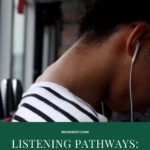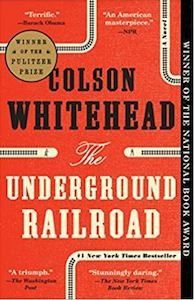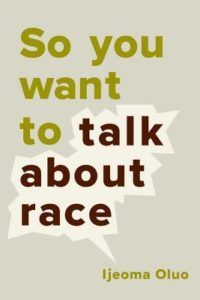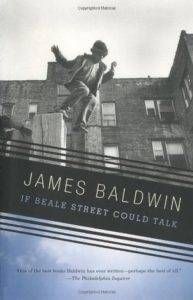She’s likely best known for her incredible performance of The Hate U Give by Angie Thomas, which won her an Audie award in 2018. While I can attest to the the brilliance of her narration in that book, it’s just the tip of the iceberg. She’s brilliant no matter what, whether she’s narrating YA romance (The Stars and the Blackness Between Them by Junauda Petrus, The Sun Is Also A Star by Nicola Yoon), a classic of the Harlem Renaissance (Cane by Jean Toomer), or literary fiction (Here Comes the Sun by Nicole Dennis-Benn). If you listen to a lot of audiobooks, you know how useful it is to have a few must-listen narrators in your back pocket. Bahni Turpin is definitely a must-listen for me. If I see her name on an audiobook, I know it’s going to be an outstanding performance. I’ve been known to pick up a book just because she narrates it, and I haven’t been disappointed yet. If you haven’t listened to any Bahni Turpin audiobooks and are wondering where to start (there are so many!) use this listening pathway as a guide. I’ve highlighted some of my favorites, representing a wide array of genres and styles. These books will give you a good introduction to Turpin’s talents as a narrator. But I guarantee that you won’t want to stop here. Luckily, you don’t have to.
Start With An Unputdownable YA Novel
On the Come Up by Angie Thomas
I loved The Hate U Give, but this one really blew me away. Sixteen-year-old Bri just wants to be a rapper, but she’s got a lot on her plate, like the fact that her family is suddenly facing homelessness, as well as all the everyday terrors and injustices that pile on top of her as a black teenage girl in America. There’s a reason this book makes such a great introduction to Turpin’s work—it’s a book that centers language. Hip-hop is absolutely central, not just to the plot but to Bri’s identity, her history, her growth. It’s a book that was written to be read out loud. Turpin beautifully inhabits teenage Bri, and, as always, nails every other character voice as well. But it’s her ability to make you really hear, and thus really feel, Bri’s rhymes, that make this audiobook so extraordinary. There’s a lot of rapping in this novel, and Turpin uses her voice to put it all on the line. All of Bri’s talent, anger, joy, frustration, energy, and exhaustion comes through loud and clear.
Next, Listen To A Brilliant Work Of Historical Fiction
The Underground Railroad by Colson Whitehead
If you’ve already read this Pulitzer prize–winning novel, in which Whitehead brilliantly imagines the Underground Railroad as an actual, physical railroad, that’s okay—you can read it again on audio. I promise you won’t be sad. Following the journey of Cora as she runs from slavery, this book is a painful read. What Bahni Turpin does is nothing short of astounding. Not only does she inhabit the many accents and dialects of a wide-ranging cast of characters, but somehow, in her voice, she carries the beating heart of the story. This is a book that is hard to read, but that is worth sinking into—it’s a book that demands the reader linger, even when lingering is exactly what the reader doesn’t want to do. Turpin’s narration makes that lingering possible. Her voice is so alive and present. She captures the complexity of Cora’s emotions, making her voice a constant anchor in a story that travels hundreds of miles across hundreds of terrors. Bonus: If you loved The Underground Railroad, I highly recommend Dread Nation by Justina Ireland. It’s a YA novel that takes place in a Civil War–era America overrun with zombies. Bahni Turpin rocks the narration out of this world.
Then Take A Dive Into Some Nonfiction
So You Want to Talk About Race by Ijeoma Oluo
This is a fantastic, beautifully clear, and accessible book that tackles big questions about systemic racism in America and about how to talk about systemic racism. But I include it here because it’s also an example of how much great narration can add to an already excellent book. Part of what makes this book so good is its directness. Oluo breaks various issues down into pieces that don’t feel overwhelming, but she doesn’t simplify. Turpin perfectly captures that particular style in her narration. It’s inviting, it’s personal, it’s engaging—but she’s also got this clear, no-bullshit tone that makes you want to sit up and pay attention. If you, like me, find it hard to get through nonfiction in print, this book is for you. And if you’re hesitant to listen to nonfiction on audio, I’d recommend this one anyway—it’s so accessible. Turpin breathes life into the more academic sections (which are already fantastic) and adds another layer of emotion to the personal stories and histories that Oluo recounts. Bonus: If you want to take an even deeper dive into feminist nonfiction, I also recommend Nasty Women by Samhita Mukhopadhyay and The Source of Self Regard by Toni Morrison. Morrison needs no introduction, but it takes a mighty fine narrator to tackle the work of such a literary giant, and Turpin is up to the task. Nasty Women is a collection of essays by a diverse group of women writers on living and fighting in Trump-era America. Turpin brings her usual talents to the audiobook, making these already excellent essays come to life.
Finish With A Classic
If Beale Street Could Talk by James Baldwin
It’s always a win-win when a great narrator narrates a classic: if you’ve never read the book, it’s a fantastic way to encounter it for the first time. If you’ve already read it, listening to it on audio is a great way to experience it again. In this novel, Turpin gives life to 19-year old Tish, a young black woman living in New York City in the 1970s. Her boyfriend, Fonny, is imprisoned after being falsely accused of a crime he didn’t commit. Tish has just found out she’s pregnant, and the book focuses on her family and Fonny’s as they try to navigate a deeply racist justice system. Turpin’s straightforward narration perfectly captures the tone of the novel. It’s a painful, heartbreaking book, but a quiet one. Baldwin doesn’t hit you over the head with anything. He just illuminates the truths of these characters living their lives in a world that continually tries to erase and imprison them. Turpin beautifully modulates her voice to reflect everything that Tish feels—her pain, fear, and exhaustion, but also her love for Fonny and her family, her determination, her hope. Looking for more Bahni Turpin audiobooks? She’s featured on these three lists of awesome narrators (because she’s awesome).




